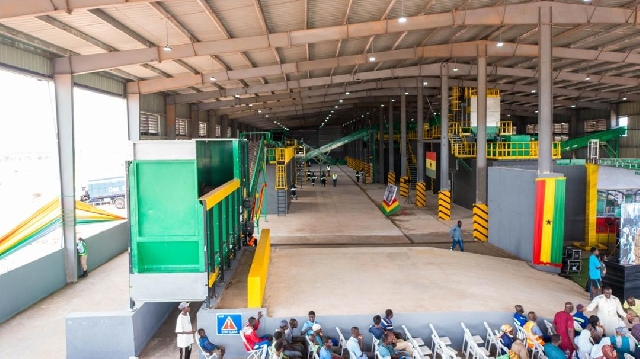New recycling plants inaugurated in Tamale
To tackle the country’s waste management challenges, an advanced Integrated Recycling and Compost Plant (IRECOP) and a Medical Waste Treatment Plant have been inaugurated in Tamale. These facilities can process 600 tons of municipal solid waste daily on a single shift, and up to 1,200 tons with two shifts.
The commissioning ceremony was attended by high-ranking government officials, members of the Parliamentary Select Committee on Environment and Sanitation, traditional leaders, and industry representatives, marking a significant step in the government’s initiative to enhance Ghana’s sanitation through public-private partnerships.
Hon. Lydia Alhassan Seyram, representing the Minister of Sanitation and Water Resources, praised the facility as a crucial achievement in modernizing waste management in Ghana. “This facility exemplifies our successful collaboration with the private sector,” she noted.
The establishment of the Ministry of Sanitation and Water Resources under President Nana Addo Dankwa Akufo-Addo’s administration aims to revamp the sector. By introducing modern recycling and treatment plants nationwide, the government intends to convert daily waste into compost and reusable materials, minimizing environmental harm and creating valuable resources.
Appreciation from traditional leaders
The Tolon Naa, Naa Yab’ Mahamudu Bawa V, speaking on behalf of Ya Na Abukari Yakubu, expressed heartfelt gratitude from the Northern Region’s people. He acknowledged the government’s leadership and the private sector’s commitment, particularly thanking President Akufo-Addo and Dr. Joseph Siaw Agyemang, Executive Chairman of the Jospong Group.
He urged Zoomlion, a Jospong subsidiary, to fulfill its corporate social responsibilities by ensuring local employment opportunities from the facility. He also requested that the area around the plant be secured to prevent encroachment and waste spillage into surrounding communities, highlighting the importance of protecting both the facility and the environment.

 Dr. Joseph Agyepong, Executive Chairman of Jospong Group of Companies
Dr. Joseph Agyepong, Executive Chairman of Jospong Group of Companies
Jospong Group’s commitment to sustainability
Dr. Joseph Siaw Agyepong reflected on his journey in waste management, recalling an eye-opening trip to China in 2006 that inspired him to innovate waste collection in Ghana. He noted, “The President laid the groundwork for these recycling plants in 2020, and we are now witnessing the results.”
The facility will process thousands of tons of waste daily, including medical and liquid waste. Dr. Agyepong thanked the chiefs and communities for their support, stating the new plant will generate over 2,000 jobs, significantly benefiting the local economy. He highlighted that the facility is expected to manage 99% of the waste generated in the Northern Region, yielding environmental and economic benefits, including carbon credits.
He dedicated the plant to the people of Tamale, envisioning it as a functional waste management site, a research hub for local universities, and a potential tourist attraction focused on waste management innovations.
Partnership with global leaders
Alexander Fernandez from Ecosteryl praised Dr. Agyepong’s foresight in envisioning the project. “Five years ago, this seemed like an unrealistic dream. Today, it has become a reality,” he stated, reaffirming Ecosteryl’s commitment to supporting Jospong in keeping Ghana at the forefront of waste management innovation in Africa.
A healthier future for Tamale
Northern Regional Minister Hon. Alhassan Shani Shaibu expressed enthusiasm for the plants, highlighting their positive impact on the region’s environmental health. He stated, “The people of the Northern Region are thrilled. These facilities will help recycle solid and medical waste, reducing disease spread and promoting cleanliness.”
The commissioning of the IRECOP and Medical Waste Treatment Plant in Tamale reflects Ghana’s steadfast dedication to transforming its waste management system. With collaborative efforts between the government and the Jospong Group, the country is progressing toward a cleaner, more sustainable environment, creating jobs, generating carbon credits, and opening doors for academic research and tourism. This project signifies a monumental stride in achieving broader environmental and public health goals.






















































